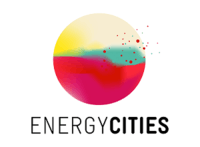Energy Cities
Energy Cities is the European Association of local authorities in energy transition. It represents 1000 towns and cities in 30 countries. From 2017 to 2020, Energy Cities is under the Presidency of the City of Heidelberg (DE). Energy Cities was established as an association of European local authorities in 1990 to put all this into practice. The association premises are located in Brussels (BE) and Besançon (FR). A part of the team works in Budapest (HU), Offenburg (DE), Freiburg im Breisgau (DE) and Zürich (CH).[1]
 | |
| Founded | 1990, Besançon, France |
|---|---|
| Founder | Gérard Magnin |
| Type | Network of cities |
| Focus | Building, Energy Efficiency, Energy, Renewables, Transport, Urbanism |
| Location | |
Region served | Europe |
| Method | Lobbying, Research, Innovation |
Membership | 180 member cities |
Official language | English, Français |
Executive Director | Claire Roumet |
Staff | 25 |
| Website | www |
Board of directors
The Board of Directors of the association is represented by the 11 European cities:[2]
| Municipality | Country |
|---|---|
| Heidelberg | DE |
| Bornova | TR |
| Cork | IE |
| Delft | NL |
| Liège | BE |
| Milton Keynes | GB |
| Modena | IT |
| Paris | FR |
| Riga | LV |
| Trnava | SK |
| Växjö | SE |
Presidency of Energy Cities
- 2005-2020 City of Heidelberg (DE), represented by Eckart Würzner, Deputy Mayor of Heidelberg
- 2000-2005 City of Odense (DK), represented by Søren Møller, Deputy Mayor of Odense
- 1997-2000 City of Barcelona (ES), represented by Pep Puig, Municipal Councillor in Barcelona
- 1994-1997 City of Besançon (FR), represented by Robert Schwint, Mayor of Besançon
- 1990-1994 Robert Schwint, Mayor of Besançon
gollark: <@474286909636476939> Turi with TuriExt.
gollark: Ha! I said something, so your "mono"logue is in fact a DIAlogue! DESTROYED WITH FACTS AND LOGIC!
gollark: You have actors which work by buying and selling stuff?
gollark: potatOS temporal relocation systems©
gollark: Even better idea: implement lambda calculus via time travel.
See also
References
- About Energy Cities. http://energy-cities.eu/-Association,8- Archived 2010-10-04 at the Wayback Machine
- Energy Cities Board of Directors. http://energy-cities.eu/-Board-of-Directors,455- Archived 2010-10-04 at the Wayback Machine
External links
This article is issued from Wikipedia. The text is licensed under Creative Commons - Attribution - Sharealike. Additional terms may apply for the media files.